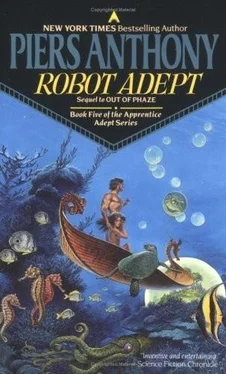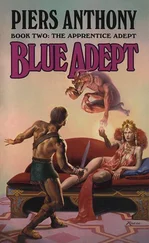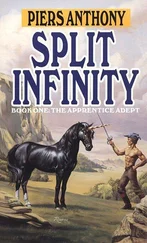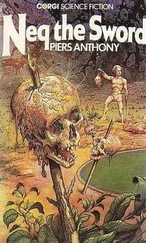Piers Anthony - Robot Adept
Здесь есть возможность читать онлайн «Piers Anthony - Robot Adept» весь текст электронной книги совершенно бесплатно (целиком полную версию без сокращений). В некоторых случаях можно слушать аудио, скачать через торрент в формате fb2 и присутствует краткое содержание. Год выпуска: 0101, Жанр: Фэнтези, на английском языке. Описание произведения, (предисловие) а так же отзывы посетителей доступны на портале библиотеки ЛибКат.
- Название:Robot Adept
- Автор:
- Жанр:
- Год:0101
- ISBN:нет данных
- Рейтинг книги:3 / 5. Голосов: 1
-
Избранное:Добавить в избранное
- Отзывы:
-
Ваша оценка:
- 60
- 1
- 2
- 3
- 4
- 5
Robot Adept: краткое содержание, описание и аннотация
Предлагаем к чтению аннотацию, описание, краткое содержание или предисловие (зависит от того, что написал сам автор книги «Robot Adept»). Если вы не нашли необходимую информацию о книге — напишите в комментариях, мы постараемся отыскать её.
Robot Adept — читать онлайн бесплатно полную книгу (весь текст) целиком
Ниже представлен текст книги, разбитый по страницам. Система сохранения места последней прочитанной страницы, позволяет с удобством читать онлайн бесплатно книгу «Robot Adept», без необходимости каждый раз заново искать на чём Вы остановились. Поставьте закладку, и сможете в любой момент перейти на страницу, на которой закончили чтение.
Интервал:
Закладка:
“And I never loved a terrestrial vertebrate before. But—”
“Say it not!” he protested. “I know we must part, but fain would I delude myself that this moment be forever.”
“If we continue speaking of this, I will melt,” she warned him.
“And thou leave me, I may melt,” he said.
“Perhaps, when I am safe among my own kind, you could visit?” she asked hesitantly.
“Let me go with thee now!”
“No, you must remain, and communicate with your opposite self, and return to your own frame. Our association is only an interlude.”
“Only an interlude,” he repeated sadly.
“But we can make it count. Tell me what to do, and I shall do it for you.”
She was not being facetious. She had come to Proton to learn human ways, including especially the human mode of sexual interplay, because the Moebites wanted to work toward bisexual reproduction. They understood the theory of it, but not the practice. They believed that their species development was lagging because they lacked the stimulus of two-sex replication, and they wanted to master it.
But in the pursuit of this quest, Agape had run afoul of another aspect of such reproduction: she had fallen in love. Now she had much of the information, but lacked the desire to return to her home world and demonstrate it to others of her kind. She wanted only to remain with Bane.
Now that it was feasible to do, Bane found that he had lost the desire for sexual activity. Part of it might have been her sheer accommodation; no challenge remained, when she was completely willing and malleable. But most of it was his foolish gut feeling that once Agape had learned all that he might teach her in this regard, there would be no need for her to remain with him. Thus he wanted to conserve the experience rather than expending it, to keep her with him longer. He knew this was nonsensical, but it unmanned him for the moment.
“Let’s play another game,” he said.
She gazed at him in surprise. “Another game? But I thought—”
“Thou didst think rightly! But I—I find I be not ready. I want to experience more things with thee, a greater variety, while I may. I want to build up a store o’ precious memories. Or something. I know not exactly what I want, only that I want it to be with thee.”
“I see I have much to learn yet about the human condition,” she said, perplexed.
“Nay, it be not thee, but me,” he reassured her. “Only accept that I love thee, and let the rest be confused.”
She spread her hands in a careful human gesture. “As you wish, Bane.”
They went out to play another game, and another, and another, the victories and the losses immaterial, only the experience being important. So it continued for several days, with physical, mental and chance games of every type. They raced each other in sailcraft, they played Chinese checkers, they bluffed each other with poker, they battled with punnish riddles. Sometimes they cheated, indulging in one game while nominally playing another, as when they made love while theoretically wrestling in gelatin. Whatever else they did, they lived their joint life to the fullest extent they could manage, trying to cram decades into days.
They found themselves in machine-assisted art: playing parts in a randomly selected play whose other parts were played by programmed robots. Each of them was cued continuously on lines and action, so that there was no problem of memorization or practice. It was their challenge to interpret their parts well, with the Game Computer ready to rate their performance at the end. They had specified a play involving male-female relations, of a romantic nature, with difficulties, and the computer had made a selection from among the many thousands in its repertoire.
Thus they were acting in one by George Bernard Shaw titled You Never Can Tell, dating from the nineteenth century of Earth. Bane was VALENTINE and Agape was GLORIA CLANDON. They were well into the scene.
“Oh, Miss Clandon, Miss Clandon: how could you?” he demanded.
“What have I done?” she asked, startled.
“Thrown this enchantment on me…” And as he spoke the scripted lines, he realized that it was true: she had enchanted him, though she had not intended to.
“I hope you are not going to be so foolish—so vulgar—as to say love,” she responded with uncertain feeling. According to the play, she had no special feeling for him, but in reality she did; this was getting difficult for her.
“No, no, no, no, no. Not love; we know better than that,” he said earnestly. “Let’s call it chemistry…” And wasn’t this also true? What was love, really? But as he spoke, he became aware of something that should have been irrelevant. They had an audience.
“Nonsense!” she exclaimed with more certainty.
They had not had an audience when they started. Several serfs had entered the chamber and taken seats. Why? This was a private game, of little interest to anyone else. “…you’re a prig: a feminine prig: that’s what you are,” he said, enjoying the line. “Now I suppose you’ve done with me forever.”
“…I have many faults,” she said primly. “Very serious faults—of character and temper; but if there is one thing that I am not, it is what you call a prig.” She gazed challengingly at him.
“Oh, yes, you are. My reason tells me so: my experience tells me so.” And his reason and experience told him that something was wrong: there should be no audience.
“…your knowledge and your experience are not infallible,” she was saying, handling her lines with increasing verve. “At least I hope not.”
“I must believe them,” he said, wishing he could warn her about the audience without interfering with the set lines. “Unless you wish me to believe my eyes, my heart, my instincts, my imagination, which are all telling me the most monstrous lies about you.”
“Lies!”
Yet more serfs were entering the audience chamber. Were they players waiting for their turn? “Yes, lies.” He sat down beside her, as the script dictated, but wasn’t sure he did it convincingly. “Do you expect me to believe that you are the most beautiful woman in the world?”
Now she was evidently feeling the relevance! “That is ridiculous, and rather personal.”
“Of course it’s ridiculous…” His developing paranoia about the audience was, too! He wished they could just quit the play here, and get away; he didn’t trust this at all. But as they exchanged their lines, his apprehension increased. Suppose the Contrary Citizens had managed to divert Blue’s minions, so that there was no protection for the moment?
“And I’m a feminine prig,” she was saying.
“No, no: I can’t face that: I must have one illusion left: the illusion about you. I love you.”
She rose, as the cue dictated, and turned. Then she spied the audience. She almost lost her place. “I am sorry. I—” Now she did lose it, and barely recovered. “What can I say?”
What, indeed? Now it seemed sure: the Citizens were about to make their move. But how could he get away from here with Agape, without setting off the trap? They needed a natural exit, to get offstage, out of sight.
“…I can’t tell you—” he was saying.
“Oh, stop telling me how you feel: I can’t bear it.”
And he saw that the scene was coming to a close. Here was their chance! “Ah, it’s come at last: my moment of courage.” He seized her hands, according to the script, and she looked at him in simulated terror, also scripted. But their emotions were becoming real, for a different reason. “Our moment of courage!” He drew her in to him and kissed her. “Now you’ve done it, Agape. It’s all over: we’re in love with one another.”
Читать дальшеИнтервал:
Закладка:
Похожие книги на «Robot Adept»
Представляем Вашему вниманию похожие книги на «Robot Adept» списком для выбора. Мы отобрали схожую по названию и смыслу литературу в надежде предоставить читателям больше вариантов отыскать новые, интересные, ещё непрочитанные произведения.
Обсуждение, отзывы о книге «Robot Adept» и просто собственные мнения читателей. Оставьте ваши комментарии, напишите, что Вы думаете о произведении, его смысле или главных героях. Укажите что конкретно понравилось, а что нет, и почему Вы так считаете.











